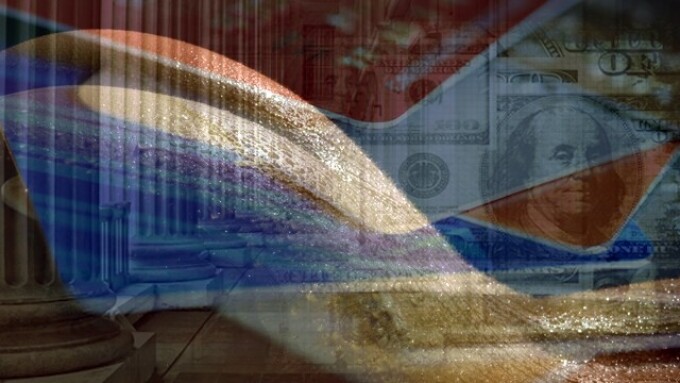LOS ANGELES — A new report is casting light on a problem that is well known to adult entertainment professionals: a growing number of banks want nothing to do with them or their money — but this anti-porn stance is taking a broader toll, because it is also anti-women.
“For nearly a decade, PayPal, JPMorgan Chase, Visa/MasterCard, and now Square, have systematically denied or closed accounts of small businesses, artists and independent contractors whose business happens to be about sex,” notes writer Violet Blue in a new article for Engadget.com. “These payment processing authorities have also coerced websites to cease featuring sexual content under threat of service withdrawal, all while blaming ambiguous rules or pressure from one another.”
The report spotlights Chase bank’s widely publicized termination of accounts held by adult performers, and the widespread refusal of service exercised by other financial institutions.
“Indisputably, the Internet ushered in an empowered landscape for sex workers and porn stars alike to finally have their own voice and be heard. Interestingly, with this came an eager market for women-run and -directed porn businesses, as well as erotica by and for women,” Blue explains. “Sadly, in this new sex-information ecosystem, denial of access to economic opportunity has also blossomed.”
Blue points to PayPal and its pattern of “denying service, seizing accounts and freezing funds for anyone discovered to be associated with sexual content online — even educational or artistic content,” a tragic situation for many adult performers, producers and promoters, who have not been treated on an equal level with other businesspeople and companies — and a policy that has had a disproportionately large impact on women, including artists, entertainers and escorts, writers, and more.
The report amply illustrates how payment providers such as PayPal, Square, and WePay, discriminate against anyone and anything with even the remotest connection to adult entertainment — and when called out for it, hide behind vague excuses and rely upon blaming acquiring banks and card associations such as MasterCard and Visa — with WePay reportedly stating that “Both acquiring banks and the card brands generally restrict the processing of payments for any activity that is deemed unlawful, high-risk or ‘brand damaging’ to the networks,” when questioned about its cancellation of an account that was used as a medical fundraiser for a former performer.
The problem of adult’s access to banking services could be easier to solve if the banks and other service providers would take responsibility for their actions, rather than blaming each other for their decisions, with Blue citing PayPal’s blaming of MasterCard/Visa for its “non-adult” policy, while card associations claim “they have nothing to do with the actions of PayPal, or anyone in the business of denying financial services to erotic material.”
Recent events such as a ruling that a local sheriff violated the First Amendment rights of Backpage.com when he pressured MasterCard and Visa to stop processing the site’s classified ad sales, and new FDIC guidance of what constitutes “high risk” transactions and more, are also detailed in the report.
“Ultimately the fact of the matter is, while keeping corporate mitts off free speech is everyone’s business, sex is becoming a woman’s business,” Blue concludes. “All women deserve business opportunities facilitated by Chase, PayPal and Square — not just the women who live in what these companies consider the ‘right neighborhoods’ on the Internet.”
To read the full report, click here.







